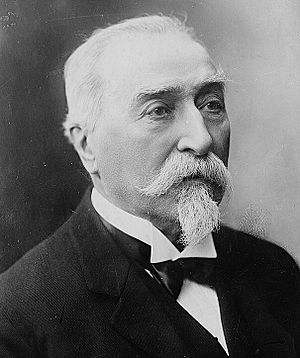Émile Combes facts for kids
Quick facts for kids
Émile Combes
|
|
|---|---|
 |
|
| Prime Minister of France | |
| In office 7 June 1902 – 24 January 1905 |
|
| President | Émile Loubet |
| Preceded by | Pierre Waldeck-Rousseau |
| Succeeded by | Maurice Rouvier |
| Personal details | |
| Born | 6 September 1835 Roquecourbe |
| Died | 25 May 1921 (aged 85) Pons, Charente-Maritime |
| Political party | Radical Party |
Émile Justin Louis Combes (born 6 September 1835, died 25 May 1921) was an important French statesman. He was also a Freemason. From June 1902 to January 1905, he led the French government as Prime Minister. His government was known as the "Lefts Bloc."
Contents
Émile Combes's Early Life and Career
Émile Combes was born in Roquecourbe, a town in France. His father, Jean Combes, was a simple dressmaker. Émile was the sixth of ten children in his family.
He first learned Latin from his school teacher. Later, his godfather, Jean Gaubert, who was a priest and his cousin, also taught him. His godfather really wanted Émile to become a priest.
Thanks to his strong Latin skills, Émile entered a seminary (a school for training priests) when he was twelve. His godfather helped pay for his studies. Émile even wore the special clothes of a priest for a while. However, he decided not to become a priest in the end.
Later in his life, Émile Combes became known for his anti-clerical views. This means he believed the government should be separate from the church. He also became a Freemason, which is a member of a social and charitable organization.
He earned a degree in literature in 1860. Then, he studied medicine and became a doctor in 1867. He started his medical practice in a town called Pons.
In 1881, Émile Combes tried to become a politician in Saintes but did not win. However, in 1885, he was elected to the French Senate. This is like being elected to a country's parliament. He was part of the "Democratic Left" political group. He became vice-president of the Senate in 1893 and 1894. His work on education issues caught people's attention. In 1895, he became the Minister of Public Instruction, which meant he was in charge of education for the whole country.
Émile Combes as Prime Minister
Émile Combes strongly supported the government that came before his. When that government stepped down in 1902, he was asked to form his own government. He became the Prime Minister and also took on the role of Minister of the Interior.
His government's main goal was to reduce the influence of the church in public life. Political groups on the left side, who agreed on this issue, supported him. They passed new laws about religious groups. Under his leadership, France began to clearly separate the church and the state. This means the government and religious organizations would operate independently.
By 1904, about 10,000 religious schools were closed because of his efforts. Thousands of priests and nuns left France rather than face difficulties.
Many conservative groups strongly opposed Combes. They saw the closing of church schools as unfair to religion. Combes led the anti-church coalition, while groups like the "Popular Liberal Action" (ALP) opposed him. The ALP had more public support and money, but fewer seats in the government.
Some people who liked his strong actions called him le petit père (the little father). In 1904, a scandal happened involving his Minister of War, General André. It was discovered that General André was using Freemasons to spy on army officers. They checked if officers were religious. If they were observant Catholics, General André made sure they would not get promoted. This scandal, called the Affaire Des Fiches, hurt the government's support. It also made soldiers feel bad because they realized that their private lives were more important than their work.
Because of this scandal, some of his political allies stopped supporting him. Émile Combes resigned on 17 January 1905. Even though he resigned, his ideas continued to be important. When the law separating church and state was finally passed, many political leaders honored him. They said he was the true leader behind this important change.
Émile Combes's Later Life
The campaign to separate the church and state was the last major political action in Émile Combes's life. After he resigned as Prime Minister in 1905, he still had some influence. However, he did not take a big public role in politics anymore. In 1915, he joined another government as one of five experienced elder statesmen, but he did not have a specific job.
During Émile Combes's time as Prime Minister, many social reforms happened. These were changes that helped people in society. For example, miners got an eight-hour workday. Many other workers got a ten-hour workday. The time people had to serve in the military was reduced from three years to two years. Some special rules that allowed middle-class people to avoid military service were removed. There was also some help for people who were sick for a long time, disabled, or elderly. In 1903, new safety rules were put in place for shops and offices.
Émile Combes died on 25 May 1921 in Pons, France.
See also
 In Spanish: Émile Combes para niños
In Spanish: Émile Combes para niños
 | Victor J. Glover |
 | Yvonne Cagle |
 | Jeanette Epps |
 | Bernard A. Harris Jr. |

